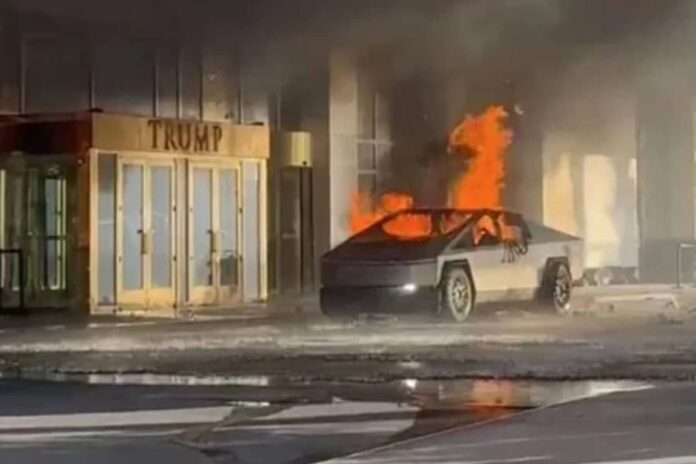The active-duty US Army Green Beret who authorities say exploded a Tesla Cybertruck outside the Trump International Hotel in Las Vegas last week used artificial intelligence to plan the blast, according to the Las Vegas Metropolitan Police Department.
Sheriff Kevin McMahill said at a Tuesday news conference the soldier, Matthew Livelsberger, started using ChatGPT to get information on how to conduct his plot, calling it a “game changer.”
“We knew that AI was going to change the game at some point or another in all of our lives,” said McMahill. “Certainly, I think this is the first incident on US soil where ChatGPT is utilized to help an individual build a particular device to learn information all across the country as they’re moving forward.”
“Absolutely, it’s a concerning moment for us,” said the sheriff.
Authorities did not say what answers ChatGPT gave Livelsberger to his searches about explosives, firearms, and how to buy a cell phone without providing personal information.
OpenAI, the developer of ChatGPT, told CNN the company is “saddened by this incident and committed to seeing AI tools used responsibly.”
“Our models are designed to refuse harmful instructions and minimize harmful content. In this case, ChatGPT responded with information already publicly available on the internet and provided warnings against harmful or illegal activities. We’re working with law enforcement to support their investigation,” an OpenAI spokesperson said.
Authorities released new information about the explosion, emphasizing Livelsberger used a bomb and describing a six-page manifesto found on his cell phone.
“This new information comes with more questions than answers. I will not provide an opinion on what the documents mean, nor will we release information or documents that have not been completely verified” by agency investigators, along with the FBI and ATF -the Bureau of Alcohol, Tobacco, Firearms and Explosives-, McMahill said.
The document is additional evidence to the previously released two letters, in which the suspect wrote of “political grievances,” armed conflicts elsewhere and domestic issues in the days leading up to his suicide, officials said Friday.
Livelsberger, 37, of Colorado, was on leave from his base in Germany at the time of Wednesday’s blast, sources told CNN. He fatally shot himself shortly before the truck exploded and seven other people were injured, officials said.
Soldier used car bomb to explode Cybertruck, authorities say
The explosion was caused by a combination of fireworks, gas tanks and camping fuel in the bed of the vehicle detonated by a device controlled by the driver.
Authorities on Tuesday said a car bomb or vehicle-borne improvised explosive device was used to explode the Cybertruck, citing video footage that confirmed the suspect “did prepare and stage for his planned attack,” said Assistant Sheriff Dori Koren.
The incident appeared to be “a tragic case of suicide involving a heavily decorated combat veteran who was struggling with PTSD and other issues,” Spencer Evans, the special agent in charge of the FBI’s Las Vegas Division, said Friday.
Three 50-caliber, expended cartridge casings were were recovered at the scene, said Koren, and two of them had “primers that were burned out through the intense heat.”
“This is consistent with the type of explosion that we believe occurred,” said Koren.
In the six-page document, the soldier discusses the Cybertruck being used as a vehicle-borne improvised explosive device and describes “graphic encounters from his military experience that replay in his head over and over, and that now he feels like he’s a shell of a human being with nothing to live for,” authorities said.
He also talked about his intent to make the blast “as public as possible” and that he is “loaded up on boom and quotations and fireworks for New Year’s,” police said.
The sheriff said the explosion could have been much greater, but in one of the suspect’s writings, he said he “didn’t intend to hurt anybody else.”
Initial findings from the investigation found at least 60 pounds of explosive material, said Kenny Cooper, assistant special agent in charge with the ATF.
“If he was to achieve a high order detonation of that, it would have been a significantly different blast,” said Cooper. “Whether he failed to achieve that mission, whether he backed out of that and went more to just a suicide – those are just hypotheticals we can’t get inside his head to answer.”
When asked if authorities consider the explosion a terrorist attack, the sheriff said, “We haven’t closed a single door on what the investigation is looking at.” He said no additional suspects will be prosecuted for the case.
By Emma Tucker, CNN

